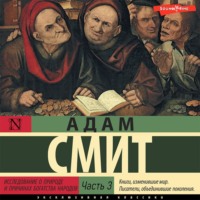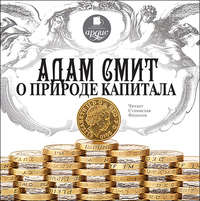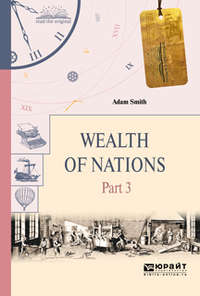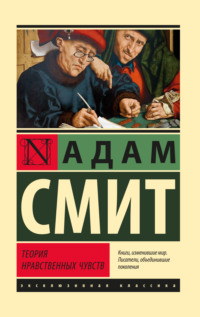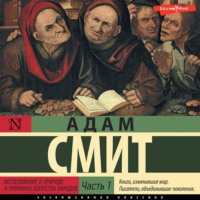 полная версия
полная версияAn Inquiry Into the Nature and Causes of the Wealth of Nations
Consumption is the sole end and purpose of all production; and the interest of the producer ought to be attended to, only so far as it may be necessary for promoting that of the consumer.
The maxim is so perfectly self-evident, that it would be absurd to attempt to prove it. But in the mercantile system, the interest of the consumer is almost constantly sacrificed to that of the producer; and it seems to consider production, and not consumption, as the ultimate end and object of all industry and commerce.
In the restraints upon the importation of all foreign commodities which can come into competition with those of our own growth or manufacture, the interest of the home consumer is evidently sacrificed to that of the producer. It is altogether for the benefit of the latter, that the former is obliged to pay that enhancement of price which this monopoly almost always occasions.
It is altogether for the benefit of the producer, that bounties are granted upon the exportation of some of his productions. The home consumer is obliged to pay, first, the tax which is necessary for paying the bounty; and, secondly, the still greater tax which necessarily arises from the enhancement of the price of the commodity in the home market.
By the famous treaty of commerce with Portugal, the consumer is prevented by high duties from purchasing of a neighbouring country, a commodity which our own climate does not produce; but is obliged to purchase it of a distant country, though it is acknowledged, that the commodity of the distant country is of a worse quality than that of the near one. The home consumer is obliged to submit to this inconvenience, in order that the producer may import into the distant country some of his productions, upon more advantageous terms than he otherwise would have been allowed to do. The consumer, too, is obliged to pay whatever enhancement in the price of those very productions this forced exportation may occasion in the home market.
But in the system of laws which has been established for the management of our American and West Indies colonies, the interest of the home consumer has been sacrificed to that of the producer, which a more extravagant profusion than in all our other commercial regulations. A great empire has been established for the sole purpose of raising up a nation of customers, who should be obliged to buy, from the shops of our different producers, all the goods with which these could supply them. For the sake of that little enhancement of price which this monopoly might afford our producers, the home consumers have been burdened with the whole expense of maintaining and defending that empire. For this purpose, and for this purpose only, in the last two wars, more than two hundred millions have been spent, and a new debt of more than a hundred and seventy millions has been contracted, over and above all that had been expended for the same purpose in former wars. The interest of this debt alone is not only greater than the whole extraordinary profit which, it never could be pretended, was made by the monopoly of the colony trade, but than the whole value of that trade, or than the whole value of the goods which, at an average, have been annually exported to the colonies.
It cannot be very difficult to determine who have been the contrivers of this whole mercantile system; not the consumers, we may believe, whose interest has been entirely neglected; but the producers, whose interest has been so carefully attended to; and among this latter class, our merchants and manufacturers have been by far the principal architects. In the mercantile regulations, which have been taken notice of in this chapter, the interest of our manufacturers has been most peculiarly attended to; and the interest, not so much of the consumers, as that of some other sets of producers, has been sacrificed to it.
CHAP. IX.
OF THE AGRICULTURAL SYSTEMS, OR OF THOSE SYSTEMS OF POLITICAL ECONOMY WHICH REPRESENT THE PRODUCE OF LAND, AS EITHER THE SOLE OR THE PRINCIPAL SOURCE OF THE REVENUE AND WEALTH OF EVERY COUNTRY
The agricultural systems of political economy will not require so long an explanation as that which I have thought it necessary to bestow upon the mercantile or commercial system.
That system which represents the produce of land as the sole source of the revenue and wealth of every country, has, so far as I know, never been adopted by any nation, and it at present exists only in the speculations of a few men of great learning and ingenuity in France. It would not, surely, be worth while to examine at great length the errors of a system which never has done, and probably never will do, any harm in any part of the world. I shall endeavour to explain, however, as distinctly as I can, the great outlines of this very ingenious system.
Mr. Colbert, the famous minister of Lewis XIV. was a man of probity, of great industry, and knowledge of detail; of great experience and acuteness in the examination of public accounts; and of abilities, in short, every way fitted for introducing method and good order into the collection and expenditure of the public revenue. That minister had unfortunately embraced all the prejudices of the mercantile system, in its nature and essence a system of restraint and regulation, and such as could scarce fail to be agreeable to a laborious and plodding man of business, who had been accustomed to regulate the different departments of public offices, and to establish the necessary checks and controuls for confining each to its proper sphere. The industry and commerce of a great country, he endeavoured to regulate upon the same model as the departments of a public office; and instead of allowing every man to pursue his own interest his own way, upon the liberal plan of equality, liberty, and justice, he bestowed upon certain branches of industry extraordinary privileges, while he laid others under as extraordinary restraints. He was not only disposed, like other European ministers, to encourage more the industry of the towns than that of the country; but, in order to support the industry of the towns, he was willing even to depress and keep down that of the country. In order to render provisions cheap to the inhabitants of the towns, and thereby to encourage manufactures and foreign commerce, he prohibited altogether the exportation of corn, and thus excluded the inhabitants of the country from every foreign market, for by far the most important part of the produce of their industry. This prohibition, joined to the restraints imposed by the ancient provincial laws of France upon the transportation of corn from one province to another, and to the arbitrary and degrading taxes which are levied upon the cultivators in almost all the provinces, discouraged and kept down the agriculture of that country very much below the state to which it would naturally have risen in so very fertile a soil, and so very happy a climate. This state of discouragement and depression was felt more or less in every different part of the country, and many different inquiries were set on foot concerning the causes of it. One of those causes appeared to be the preference given, by the institutions of Mr. Colbert, to the industry of the towns above that of the country.
If the rod be bent too much one way, says the proverb, in order to make it straight, you must bend it as much the other. The French philosophers, who have proposed the system which represents agriculture as the sole source of the revenue and wealth of every country, seem to have adopted this proverbial maxim; and, as in the plan of Mr. Colbert, the industry of the towns was certainly overvalued in comparison with that of the country, so in their system it seems to be as certainly under-valued.
The different orders of people, who have ever been supposed to contribute in any respect towards the annual produce of the land and labour of the country, they divide into three classes. The first is the class of the proprietors of land. The second is the class of the cultivators, of farmers and country labourers, whom they honour with the peculiar appellation of the productive class. The third is the class of artificers, manufacturers, and merchants, whom they endeavour to degrade by the humiliating appellation of the barren or unproductive class.
The class of proprietors contributes to the annual produce, by the expense which they may occasionally lay out upon the improvement of the land, upon the buildings, drains, inclosures, and other ameliorations, which they may either make or maintain upon it, and by means of which the cultivators are enabled, with the same capital, to raise a greater produce, and consequently to pay a greater rent. This advanced rent may be considered as the interest or profit due to the proprietor, upon the expense or capital which he thus employs in the improvement of his land. Such expenses are in this system called ground expenses (depenses foncieres).
The cultivators or farmers contribute to the annual produce, by what are in this system called the original and annual expenses (depenses primitives, et depenses annuelles), which they lay out upon the cultivation of the land. The original expenses consist in the instruments of husbandry, in the stock of cattle, in the seed, and in the maintenance of the farmer's family, servants, and cattle, during at least a great part of the first year of his occupancy, or till he can receive some return from the land. The annual expenses consist in the seed, in the wear and tear of instruments of husbandry, and in the annual maintenance of the farmer's servants and cattle, and of his family too, so far as any part of them can be considered as servants employed in cultivation. That part of the produce of the land which remains to him after paying the rent, ought to be sufficient, first, to replace to him, within a reasonable time, at least during the term of his occupancy, the whole of his original expenses, together with the ordinary profits of stock; and, secondly, to replace to him annually the whole of his annual expenses, together likewise with the ordinary profits of stock. Those two sorts of expenses are two capitals which the farmer employs in cultivation; and unless they are regularly restored to him, together with a reasonable profit, he cannot carry on his employment upon a level with other employments; but, from a regard to his own interest, must desert it as soon as possible, and see some other. That part of the produce of the land which is thus necessary for enabling the farmer to continue his business, ought to be considered as a fund sacred to cultivation, which, if the landlord violates, he necessarily reduces the produce of his own land, and, in a few years, not only disables the farmer from paying this racked rent, but from paying the reasonable rent which he might otherwise have got for his land. The rent which properly belongs to the landlord, is no more than the neat produce which remains after paying, in the completest manner, all the necessary expenses which must be previously laid out, in order to raise the gross or the whole produce. It is because the labour of the cultivators, over and above paying completely all those necessary expenses, affords a neat produce of this kind, that this class of people are in this system peculiarly distinguished by the honourable appellation of the productive class. Their original and annual expenses are for the same reason called, in this system, productive expenses, because, over and above replacing their own value, they occasion the annual reproduction of this neat produce.
The ground expenses, as they are called, or what the landlord lays out upon the improvement of his land, are, in this system, too, honoured with the appellation of productive expenses. Till the whole of those expenses, together with the ordinary profits of stock, have been completely repaid to him by the advanced rent which he gets from his land, that advanced rent ought to be regarded as sacred and inviolable, both by the church and by the king; ought to be subject neither to tithe nor to taxation. If it is otherwise, by discouraging the improvement of land, the church discourages the future increase of her own tithes, and the king the future increase of his own taxes. As in a well ordered state of things, therefore, those ground expenses, over and above reproducing in the completest manner their own value, occasion likewise, after a certain time, a reproduction of neat produce, they are in this system considered as productive expenses.
The ground expenses of the landlord, however, together with the original and the annual expenses of the farmer, are the only three sorts of expenses which in this system are considered as productive. All other expenses, and all other orders of people, even those who, in the common apprehensions of men, are regarded as the most productive, are, in this account of things, represented as altogether barren and unproductive.
Artificers and manufacturers, in particular, whose industry, in the common apprehensions of men, increases so much the value of the rude produce of land, are in this system represented as a class of people altogether barren and unproductive. Their labour, it is said, replaces only the stock which employs them, together with its ordinary profits. That stock consists in the materials, tools, and wages, advanced to them by their employer; and is the fund destined for their employment and maintenance. Its profits are the fund destined for the maintenance of their employer. Their employer, as he advances to them the stock of materials, tools, and wages, necessary for their employment, so he advances to himself what is necessary for his own maintenance; and this maintenance he generally proportions to the profit which he expects to make by the price of their work. Unless its price repays to him the maintenance which he advances to himself, as well as the materials, tools, and wages, which he advances to his workmen, it evidently does not repay to him the whole expense which he lays out upon it. The profits of manufacturing stock, therefore, are not, like the rent of land, a neat produce which remains after completely repaying the whole expense which must be laid out in order to obtain them. The stock of the farmer yields him a profit, as well as that of the master manufacturer; and it yields a rent likewise to another person, which that of the master manufacturer does not. The expense, therefore, laid out in employing and maintaining artificers and manufacturers, does no more than continue, if one may say so, the existence of its own value, and does not produce any new value. It is, therefore, altogether a barren and unproductive expense. The expense, on the contrary, laid out in employing farmers and country labourers, over and above continuing the existence of its own value, produces a new value the rent of the landlord. It is, therefore, a productive expense.
Mercantile stock is equally barren and unproductive with manufacturing stock. It only continues the existence of its own value, without producing any new value. Its profits are only the repayment of the maintenance which its employer advances to himself during the time that he employs it, or till he receives the returns of it. They are only the repayment of a part of the expense which must be laid out in employing it.
The labour of artificers and manufacturers never adds any thing to the value of the whole annual amount of the rude produce of the land. It adds, indeed, greatly to the value of some particular parts of it. But the consumption which, in the mean time, it occasions of other parts, is precisely equal to the value which it adds to those parts; so that the value of the whole amount is not, at any one moment of time, in the least augmented by it. The person who works the lace of a pair of fine ruffles for example, will sometimes raise the value of, perhaps, a pennyworth of flax to L.30 sterling. But though, at first sight, he appears thereby to multiply the value of a part of the rude produce about seven thousand and two hundred times, he in reality adds nothing to the value of the whole annual amount of the rude produce. The working of that lace costs him, perhaps, two years labour. The L.30 which he gets for it when it is finished, is no more than the repayment of the subsistence which he advances to himself during the two years that he is employed about it. The value which, by every day's, month's, or year's labour, he adds to the flax, does no more than replace the value of his own consumption during that day, month, or year. At no moment of time, therefore, does he add any thing to the value of the whole annual amount of the rude produce of the land: the portion of that produce which he is continually consuming, being always equal to the value which he is continually producing. The extreme poverty of the greater part of the persons employed in this expensive, though trifling manufacture, may satisfy us that the price of their work does not, in ordinary cases, exceed the value of their subsistence. It is otherwise with the work of farmers and country labourers. The rent of the landlord is a value which, in ordinary cases, it is continually producing over and above replacing, in the most complete manner, the whole consumption, the whole expense laid out upon the employment and maintenance both of the workmen and of their employer.
Artificers, manufacturers, and merchants, can augment the revenue and wealth of their society by parsimony only; or, as it is expressed in this system, by privation, that is, by depriving themselves of a part of the funds destined for their own subsistence. They annually reproduce nothing but those funds. Unless, therefore, they annually save some part of them, unless they annually deprive themselves of the enjoyment of some part of them, the revenue and wealth of their society can never be, in the smallest degree, augmented by means of their industry. Farmers and country labourers, on the contrary, may enjoy completely the whole funds destined for their own subsistence, and yet augment, at the same time, the revenue and wealth of their society. Over and above what is destined for their own subsistence, their industry annually affords a neat produce, of which the augmentation necessarily augments the revenue and wealth of their society. Nations, therefore, which like France or England, consist in a great measure, of proprietors and cultivators, can be enriched by industry and enjoyment. Nations, on the contrary which, like Holland and Hamburgh, are composed chiefly of merchants, artificers, and manufacturers, can grow rich only through parsimony and privation. As the interest of nations so differently circumstanced is very different, so is likewise the common character of the people. In those of the former kind, liberality, frankness, and good fellowship, naturally make a part of their common character; in the latter, narrowness, meanness, and a selfish disposition, averse to all social pleasure and enjoyment.
The unproductive class, that of merchants, artificers, and manufacturers, is maintained and employed altogether at the expense of the two other classes, of that of proprietors, and of that of cultivators. They furnish it both with the materials of its work, and with the fund of its subsistence, with the corn and cattle which it consumes while it is employed about that work. The proprietors and cultivators finally pay both the wages of all the workmen of the unproductive class, and the profits of all their employers. Those workmen and their employers are properly the servants of the proprietors and cultivators. They are only servants who work without doors, as menial servants work within. Both the one and the other, however, are equally maintained at the expense of the same masters. The labour of both is equally unproductive. It adds nothing to the value of the sum total of the rude produce of the land. Instead of increasing the value of that sum total, it is a charge and expense which must be paid out of it.
The unproductive class, however, is not only useful, but greatly useful, to the other two classes. By means of the industry of merchants, artificers, and manufacturers, the proprietors and cultivators can purchase both the foreign goods and the manufactured produce of their own country, which they have occasion for, with the produce of a much smaller quantity of their own labour, than what they would be obliged to employ, if they were to attempt, in an awkward and unskilful manner, either to import the one, or to make the other, for their own use. By means of the unproductive class, the cultivators are delivered from many cares, which would otherwise distract their attention from the cultivation of land. The superiority of produce, which in consequence of this undivided attention, they are enabled to raise, is fully sufficient to pay the whole expense which the maintenance and employment of the unproductive class costs either the proprietors or themselves. The industry of merchants, artificers, and manufacturers, though in its own nature altogether unproductive, yet contributes in this manner indirectly to increase the produce of the land. It increases the productive powers of productive labour, by leaving it at liberty to confine itself to its proper employment, the cultivation of land; and the plough goes frequently the easier and the better, by means of the labour of the man whose business is most remote from the plough.
It can never be the interest of the proprietors and cultivators, to restrain or to discourage, in any respect, the industry of merchants, artificers, and manufacturers. The greater the liberty which this unproductive class enjoys, the greater will be the competition in all the different trades which compose it, and the cheaper will the other two classes be supplied, both with foreign goods and with the manufactured produce of their own country.
It can never be the interest of the unproductive class to oppress the other two classes. It is the surplus produce of the land, or what remains after deducting the maintenance, first of the cultivators, and afterwards of the proprietors, that maintains and employs the unproductive class. The greater this surplus, the greater must likewise be the maintenance and employment of that class. The establishment of perfect justice, of perfect liberty, and of perfect equality, is the very simple secret which most effectually secures the highest degree of prosperity to all the three classes.
The merchants, artificers, and manufacturers of those mercantile states, which, like Holland and Hamburgh, consist chiefly of this unproductive class, are in the same manner maintained and employed altogether at the expense of the proprietors and cultivators of land. The only difference is, that those proprietors and cultivators are, the greater part of them, placed at a most inconvenient distance from the merchants, artificers, and manufacturers, whom they supply with the materials of their work and the fund of their subsistence; are the inhabitants of other countries, and the subjects of other governments.
Such mercantile states, however, are not only useful, but greatly useful, to the inhabitants of these other countries. They fill up, in some measure, a very important void; and supply the place of the merchants, artificers, and manufacturers, whom the inhabitants of those countries ought to find at home, but whom, from some defect in their policy, they do not find at home.
It can never be the interest of those landed nations, if I may call them so, to discourage or distress the industry of such mercantile states, by imposing high duties upon their trade, or upon the commodities which they furnish. Such duties, by rendering those commodities dearer, could serve only to sink the real value of the surplus produce of their own land, with which, or, what comes to the same thing, with the price of which those commodities are purchased. Such duties could only serve to discourage the increase of that surplus produce, and consequently the improvement and cultivation of their own land. The most effectual expedient, on the contrary, for raising the value of that surplus produce, for encouraging its increase, and consequently the improvement and cultivation of their own land, would be to allow the most perfect freedom to the trade of all such mercantile nations.
This perfect freedom of trade would even be the most effectual expedient for supplying them, in due time, with all the artificers, manufacturers, and merchants, whom they wanted at home; and for filling up, in the properest and most advantageous manner, that very important void which they felt there.




